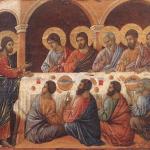
In Scripture. God speaks to the leaders of the peoples, telling them that they must rule justly. That means, they must treat the poor, the needy, the afflicted, the stranger, the widow or orphan, with respect. If, on the other hand, they contemptuously mistreat the lowly of the world, they risk divine judgment. The prophet Isaiah made it clear that social injustices caused divine retribution:
The LORD enters into judgment with the elders and princes of his people: “It is you who have devoured the vineyard, the spoil of the poor is in your houses. What do you mean by crushing my people, by grinding the face of the poor?” says the Lord GOD of hosts (Isa. 3:14-15 RSV).
St. Isidore of Seville, speaking to Christians, warns us similarly:
The oppressors of the poor should know that they are deserving of a more serious sentence when they have prevailed over those whom they desired to injure. For they are to be condemned to a more atrocious future punishment to the extent that the have behaved more forcefully in this world against the life of the wretched ones.[1]
Righteousness is linked with the way we treat the poor. While we might think fasting is good, by itself it does nothing; it has to come with the right intention. It must be used to combat our own internal demons, our temptations to injustice; which is why Isaiah indicated that the proper form of fasting is one which does service and renders aid to the needy:
Is not this the fast that I choose: to loose the bonds of wickedness, to undo the thongs of the yoke, to let the oppressed go free, and to break every yoke? Is it not to share your bread with the hungry, and bring the homeless poor into your house; when you see the naked, to cover him, and not to hide yourself from your own flesh? (Isa. 58:6-7 RSV).
It’s all about love. How can we love God if we ignore our neighbor and their needs? “But if any one has the world’s goods and sees his brother in need, yet closes his heart against him, how does God’s love abide in him?” (1Jn. 3:17 RSV). Justice seeks to restore what is unjustly withheld, and social justice seeks to establish and give what is needy due to social imbalances and evils. Social justice is not some sort of extra to the Christian faith: it is central to the proclamation of the Gospel. It does not replace charity, but sets the stage by which proper charity can be given. When that norm, when basic human rights and dignity are neglected, such injustice must be overcome. If it is personal injustice, then it must be met with personal justice. But when it is social injustice, when it is society as a whole which has set an unjust standard and creates structures which abuse the poor and needy, then social injustice must be met with social justice. Charity, which goes beyond justice, will include justice, and will seek social justice to be established: if someone looks to impede social justice so they can then be charitable, they demonstrate not just a lack of justice but a lack of charity itself. For what they offer is not charity, not love, but vain works for their own glory.
Basic justice, as explained in Scripture, and can be deduced by reason, says that people should be shown dignity and respect, and they should be able to have their basic needs of food, shelter, clothing, and health care met (according to what prudence suggests is possible in each given circumstance). Their needs should not be used to exploit them, nor should the system which is used to make sure those needs are met be exploited. That would be devouring the poor, taking from them what rightfully should be theirs. Yet, both the poor, and the system in which the poor is being helped, are both under attack by President Trump. Not only are the poor facing extraordinary burdens in order to get food through SNAP, retailers have been told that Trump wants to charge them fees for accepting food stamps. Not only does this indicate Trump is trying to find more ways to take money out of the poor (though he has no problem helping the rich get richer), money and resources which the poor do not have, he is going to inflict undue burden on those who would otherwise help the poor. This does not seem to be an accident, but a feature, as the Trump Administration is interested in being cruel, punishing those who would otherwise follow their duty to help those in need. And, in case some might want to defend Trump’s cruelty by saying that food stamps hurt society by promoting laziness, the reality is far from different: food stamps, and other such aid, is what is necessary for someone to be able to rise beyond their poverty. It was through such social programs we see that the United States got out of past recessions; indeed, it is because such programs help put money into the economy that many jobs become available, which is why the removal of such aid is likely to cause a decline in available work. And with a decline in available work, then those in need will increase. But if there are requirements which will have to be met before the impoverished gain governmental aid, they will likely not get their needs satisfied as those requirements become impossible to be met, making the poor either perish in their poverty or turn to other means to getting what they need.
“Do not rob the poor, because he is poor, or crush the afflicted at the gate” (Prov. 22:22 RSV). Just because someone is poor does not mean they can be mistreated. The little which they have should be preserved. Taking away food stamps, placing undue burdens on the poor, burdens which many will not be able to fulfill, and using that as an excuse to rob them of what little they have, is evil. “A righteous man knows the rights of the poor; a wicked man does not understand such knowledge” (Prov. 29:7 RSV). Unjust laws are no laws, and they can and must be subverted when they harm those in need. Civil disobedience is not a luxury for the privileged. If the Trump Administration promotes abuse to the poor and needy, to the outcast, then it must be resisted: those who are jailed for doing what is right must not only be defended, but praised and raised as the example all of us need to follow. Otherwise, we will see further erosion of basic human rights until, at last, the divide between the elite and the underclass is so great, only disaster is to come.
[1] St. Isidore of Seville, Sententiae. Trans. Thomas L. Knoebel (New York: Newman Press, 2018),208.
Stay in touch! Like A Little Bit of Nothing on Facebook.
If you have liked what you read, please consider sharing it with your friends and family!













